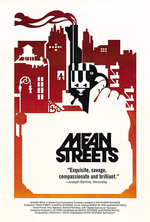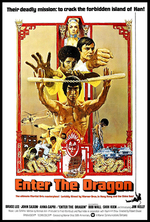Film Screening 27th September, 2013

Mean Streets
8:00 PM, 27th September, 2013
- R
- 119 mins
- 1973
- Martin Scorsese
- Martin Scorsese, Mardik Martin
- Robert De Niro, Harvey Keitel, David Proval, Richard Romanus
Mean Streets has become one of the source points for all modern gritty working-class gangster movies. It is Martin Scorsese’s third film, made on a tiny budget, and shows the director still learning as he directs now famous actors at a time when they were still finding their way. Yet its elemental, raw power has stamped it as a twentieth-century classic.
Charlie (Keitel) leans on the edge of ‘respectable’ organised crime. He tries to escape the sin of inner city New York, but is constantly dragged in by his hapless friend Johnny Boy (De Niro). Whatever plot there is more or less centers on the daily lives of these characters and the people they associate with. They go to bars, they hang out, they get in fights and they rob people. It is a sinful, gritty world.
Shot in a verité style, with furious hand-held camerawork that heightens the madness of the images, Mean Streets has a sharply improvisational quality. Scorsese’s pioneering use of pop music alongside his slow-motion cinematography (such as when Johnny Boy makes his early entrance to “Jumpin’ Jack Flash” by The Rolling Stones) is an early example of what would become a Scorsese trademark. Overall it is a film of realism, and we get a true sense of being thrust into the action.
Tom Baily

Enter The Dragon
10:14 PM, 27th September, 2013
- MA
- 110 mins
- 1973
- Robert Clouse
- Michael Allin
- Bruce Lee, John Saxon, Jim Kelly, Bob Wall
Probably the most famous martial arts film ever made, the film is enjoyable for its exotic travel feel and 1970s James Bond vibe but is a classic because of Bruce Lee’s performance, particularly his fighting in the film. Lee plays a Shaolin martial artist approached by the British secret service to attend a fight tournament held on his private island by Han (Shih Kien), a fellow former Shaolin student.
Han is suspected of drug trafficking and white slavery but his island is in neutral territory, out of the reach of the authorities. Invitees attend the tournament from all over the world including Williams (Kelly), taking a break after trouble with some racist cops, and Roper (Saxon) who owes money to the mob. The two provide some humour (and Saxon and Lee share some ironical moments) and do well in their fight scenes, but Lee is fantastic, showing a mesmerising physical ability that takes the breath away.
The film has an enjoyable seventies vibe, fashions and a darn good funky score from Lalo Schifrin. Lee spars with future HK action star Sammo Hung at the start and has memorable bouts against heavy Bob Wall and Han himself. Jackie Chan even makes an appearance as one of Han’s henchmen who gets mowed down by Lee as he sneaks around Han’s underground lair.
An entertaining action classic, this anniversary version is enhanced with 12 minutes of extra footage mostly expanding on the back-story and with welcome extra moments of Lee expounding on his martial philosophies.
Ben Snow